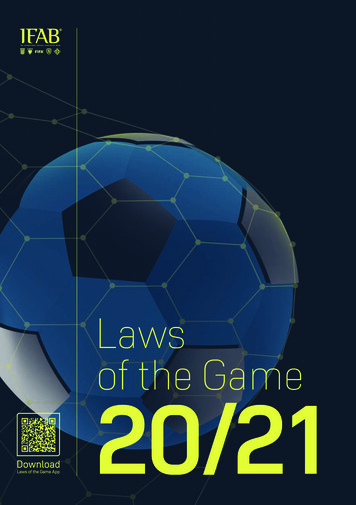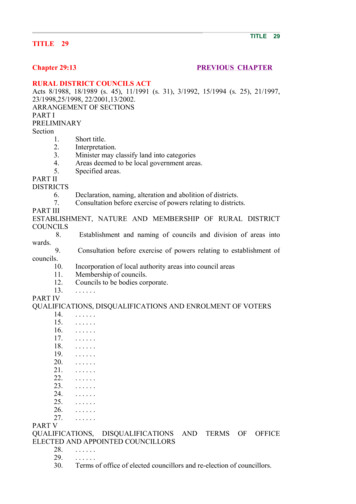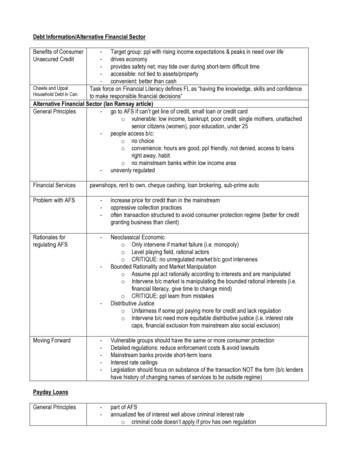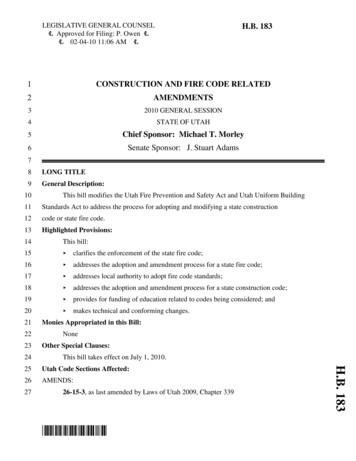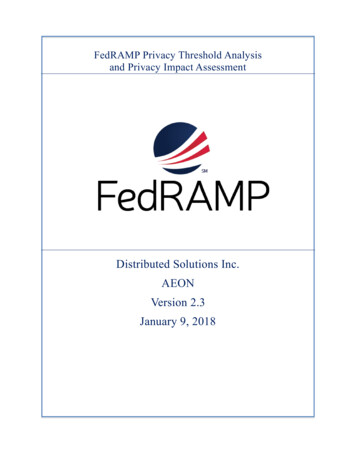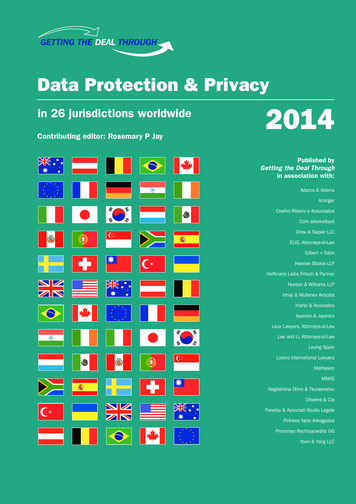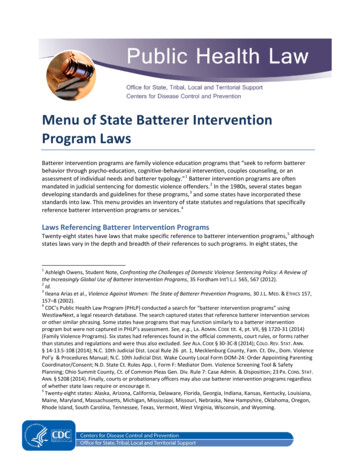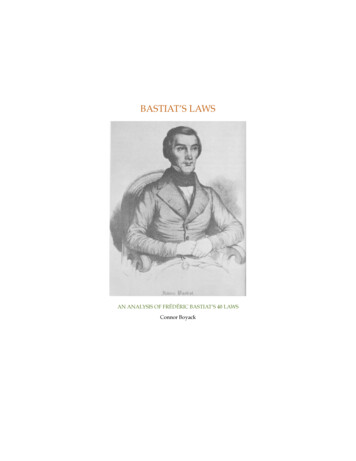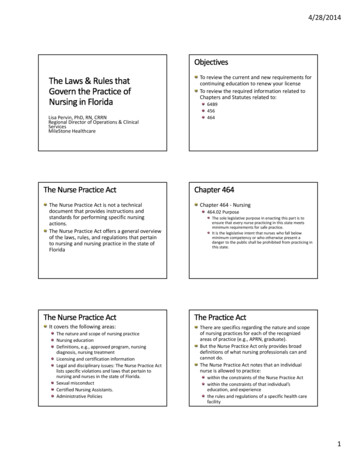
Transcription
4/28/2014To review the current and new requirements forcontinuing education to renew your licenseTo review the required information related toChapters and Statutes related to:Lisa Pervin, PhD, RN, CRRNRegional Director of Operations & ClinicalServicesMileStone Healthcare64B9456464The Nurse Practice Act is not a technicaldocument that provides instructions andstandards for performing specific nursingactions.The Nurse Practice Act offers a general overviewof the laws, rules, and regulations that pertainto nursing and nursing practice in the state ofFloridaChapter 464 ‐ NursingIt covers the following areas:There are specifics regarding the nature and scopeof nursing practices for each of the recognizedareas of practice (e.g., APRN, graduate).But the Nurse Practice Act only provides broaddefinitions of what nursing professionals can andcannot do.doThe Nurse Practice Act notes that an individualnurse is allowed to practice:The nature and scope of nursing practiceNursing educationDefinitions, e.g., approved program, nursingdiagnosis, nursing treatmentLiLicensingi andd certificationtifi ti informationi ftiLegal and disciplinary issues: The Nurse Practice Actlists specific violations and laws that pertain tonursing and nurses in the state of Florida.Sexual misconductCertified Nursing Assistants.Administrative Policies464.02 PurposeThe sole legislative purpose in enacting this part is toensure that every nurse practicing in this state meetsminimum requirements for safe practice.It is the legislative intent that nurses who fall belowminimum competency or who otherwise present adanger to the public shall be prohibited from practicing inthis state.within the constraints of the Nurse Practice Actwithin the constraints of that individual’seducation, and experiencethe rules and regulations of a specific health carefacility1
4/28/2014Hearings, Proceedings,Conferences, DisciplineMaintenance of MedicalRecordsAdministration of IV Therapyby LPNsHome HemodialysisTreatmentsDelegation to UnlicensedAssistive PersonnelLPN Supervision in NursingHome FacilitiesRole of the RN in ConsciousSedationAdministrative codes are rules and regulationsformulated by government agencies ‐ in this instance,the Florida State Department of Health.The Florida Administrative Code 64B9, administered bythe Department of Health, contains rules andregulations that apply to the profession of nursing.nursingThere are 16 sections in Administrative Code 64B9.Some of the information in sections 1‐9 and 11‐17(there is no section 10) is duplicated in the Floridastate Nurse Practice Act, but some of the sections andsome of the information contained in AdministrativeCode 64B9 are not.OrganizationNursing ProgramsRequirements for LicensureAdministrative PoliciesPertaining to Certificationoff AdAdvancedPracticedPtiRNs CE RequirementsInactive Status andReactivation of InactiveLicenseFeesImpaired Nurse ProgramCertified Nursing AssistantsAddresses more specifically what LPNs can andcannot doAddresses the Advanced Practice NurseARNP: To practice as an ARNP, a nurse mustcomplete a post‐basic education program of atleast one year duration that will lead to amaster’s degree with preparation in specializedskills and posses a certification that has beenskills,granted by a specialty certification board.An APRN in Florida can practice as a CRNA, aCNM, a CNP, or a CNS.Additional certifications may be required oncethe educational requirements have been metsuch as CRNA and CNMAn Advanced Practice Registered Nurse (APRN) isdefined as any person who is licensed in the stateto practice professional nursing and certified inadvanced or specialized nursing practice including:certified registered nurse anesthetists, certified nursemidwives, certified nurse practitioner, or clinical nursespecialist.The proper abbreviations for these titles are A.R.N.P.,C.R.N.A., C.N.M., C.N.P., and C.N.S.A Florida ARPN may only perform medical acts:Diagnosis, treatment, and operation pursuant to aprotocol between the ARPN and a Florida‐licensedmedical doctor, osteopathic physician, or dentist.Appropriate arrangements for supervision of theA.P.R.N. must be made: specifics on thesearrangements can be found in 64B9‐4.010 Standardsfor Protocols.CRNA: The requirements for certification as a CRNAand the basic scope of practice are identical tothose of the basic scope of practice of the APRN.CRNAs must be certified by the NBCRNA (NationalBoard of Certification & Recertification of NurseAnesthetists)CNM: The requirements for certification as a CNMand the basic scope of practice are identical tothose of the basic scope of practice of the APRNCNMs must be certified by the AMCB (AmericanMidwifery Certification Board).CNS: The requirements for certification as a CNSand the basic scope of practice are identical tothose of the basic scope of practice of the APRN.The certification boards that are considered acceptableare for a CNS are:1) the Oncology Nursing Certification Corporation2) American Association of Critical Care Nurses3) American Nurses Credentialing Center2
4/28/2014CNP: The requirements for certification as CNP andthe basic scope of practice of a CNP are identical tothose of the APRN.The CNP must obtain certification through one of thefollowing:1) American Nurse Credentialing Center if the CNP will bepracticing as an Adult Nurse PractitionerPractitioner, Family NursePractitioners, Gerontological Nurse Practitioner, PediatricNurse Acute Care Nurse Practitioner, or Psychiatric MentalHealth Nurse Practitioner (Adult or Family2) American Academy of Nurse Practitioners if the CNP will bepracticing as an Adult‐Gerontology Primary Care NP3) National Certification Corporation if he CNP will bepracticing as a Neonatal Nurse Practitioner or a Women’sHealth Nurse Practitioner4) Pediatric Nurse Certification Board if the CNP will bepracticing as a Pediatric Nurse practitioner, Acute or Primary.A Graduate Nurse is defined as someone who isa graduate of an approved nursing program ornursing or an equivalent who has not yet takenand passed the licensure examination for whichthat person is eligible. The title may beabbreviatedbb i d as GG.N.NA Graduate Practical nurse is defined assomeone who is a graduate of an approvednursing program of an equivalent who has notyet taken the licensure examination for whichthat person is eligible. The title may beabbreviated as G.P.N.A Graduate Nurse/Graduate Practical Nurse canadminister intravenous therapy if that person isunder the direct supervision of a registerednurse, a physician, or a dentist. (64B9‐12.004Authority for the Licensed Practical Nurse toAd i iAdministerIIntravenous ThTherapy))Practitioners who are allowed to dispensemedications must apply to the state Board ofNursing, and practitioners who dispense mustcomply with all state and federal laws andregulations as they apply to dispensingpractitioners.A Graduate Nurse/Graduate Practical Nurse canpractice nursing only if:1) she/he has applied for the licensing examinationand has been authorized by the State Board ofNursing to practice as a Graduate Nurse/GraduatePractical Nurse2) is directly supervised by a Registered Nurse.Direct supervision is defined as an RN physicallyon the premises and immediately available ifneeded.A Licensed Practical Nurse is defined as anyperson who is licensed in the state to practicepractical nursing, and the title may beabbreviated as LPN.An LPN maybe allowed to perform essentiallyall of the duties an RN might do, butThe LPN must be under the direct supervision of anRN, a licensed physician, a licensed osteopathicphysician, a licensed podiatric physician or alicensed dentist.3
4/28/2014An LPN, if qualified by training and education andapproved by place of employment, is allowed toadminister intravenous medications. There arelimits to this practice, and these limits arediscussed (Chapter 64B9 Administration ofIntravenous Therapy by Licensed Practical Nurses)An LPN may act in a supervisory role in nursinghome facilities if certain requirements are met.(64B9‐16.003 Competency and KnowledgeRequirements Necessary to Qualify the LPN toSupervise in Nursing Home Facilities; 64B9‐16.004Delegation of Tasks Prohibited)A Registered Nurse is defined as any personlicensed in the state to practice nursing, and thetitle may be abbreviated as RN.The term registered nurse and professionalnurse are used interchangeably in the NursePractice Act.The scope of practice of a registered nurse in the stateof Florida is defined as:Registered Nurses are not allowed to diagnose,prescribe medications or dispense medicationsunless the R.N. is an A.P.R.N. (Note: The termdispense is not synonymous with administer)“ performance of those acts requiring substantial specializedknowledge, judgment, and nursing skill based upon appliedprinciples of psychological, biological, physical, and socialsciences which shall include, but not be limited to:1) the observation, assessment, nursing diagnosis, planning,intervention, and evaluation of care2) health teaching and counseling of the ill, injured, or infirm3) the promotion of wellness, maintenance of health, and theprevention of illness of others4) the administration of medications and treatments as prescribedby a duly licensed practitioner authorized by the laws of this state toprescribe such medications and treatments5) the supervision and teaching of other personnel in the theory andperformance of any of the above acts. (464. 003 Definitions)A Certified Nursing Assistant (CNA) must gothrough an approved program, take a written examand a clinical skills test, and can then receivecertification if the examined skills and the test aresuccessfully completed.The CNA is then allowed to perform his/her dutieswhile under the direct supervision of a RN or a LPNor other licensed professional. (64B9‐15.001Definitions)Under certain circumstances, the CNA may practiceunder the supervision of an RN or an LPN if thatperson is not present but can easily be contactedwhen need for consultation or advice.A Certified Nursing Assistant provides basic careto patients: a complete list of can be found inthe Nurse Practice Act, section 64B9‐15.002,Certified Nursing Assistant Authorized Duties.The RN or LPN may not delegate the CNAcertain tasks. (Nurse Practice Act: Section 64B9‐14.003 Delegation of Tasks Prohibited)4
4/28/2014Nursing is a profession and is governed by rulesand ethics, and the expression of these istypically called professional conduct.Nurses are also guided and constrained by therules of conduct and the laws of society.societySome actions or behaviors may be consideredunethical and unprofessional but may not beillegal ‐ but a nurse who participated inunethical or unprofessional behavior could bepunished and/or sanctioned by the Board ofNursing.Punishments for infractions are clearly outlined,but the State Board of Nursing and the criminaljustice system consider many factors whendeciding on punishments.These factors include the danger to the public,publicprevious infractions, the length of time thenurse has practiced, the damage that has beencaused, and any attempts by the nurse tocorrect or stop the behavior in question.Falsifying or altering of patient records ornursing progress records, employmentapplications or time recordsViolating the confidentiality of information orknowledge concerning a patientDiscriminating on the basis of race, creed,religion, sex, age or national origin, in therendering of nursing services as it relates tohuman rights and dignity of the individualsEngaging in fraud, misrepresentation, or deceitin taking the licensing examinationSome actions and behaviors are unethical,unprofessional, and illegal, and would besubject to punishment by the criminal justicesystem.The overlap between unethical/unprofessionaland illegal can be complicated, and the specificdifferences between ethical and legal ‐ whatconstitutes one as opposed to another ‐ are notdiscussed.The following actions are considered to beunprofessional conduct: (Chapter 64B9‐8,Section 64B9‐8.005 Disciplinary Proceedings)Inaccurate recordingMisappropriating drugs, supplies or equipmentLeaving a nursing assignment without advisinglicensed nursing personnelStealing from a patientViolating the integrity of a medicationadministration system or an informationtechnology systemImpersonating another licensed practitioner, orpermitting another person to use his certificatefor the purpose of practicing nursingProviding false or incorrect information to theemployer regarding the status of the licenseTesting positive for any drugs under Chapter893, F.S., on any drug screen when the nursedoes not have a prescription and legitimatemedical reason for using such drugPracticing beyond the scope of the licensee’slicense, educational preparation or nursingexperience5
4/28/2014Using force against a patient, striking a patient,or throwing objects at a patientUsing abusive, threatening or foul language infront of a patient or directing such languagetoward a patient.A citation is defined as a summons to appearbefore a court, governing body, etc.A citation can be issued and a fine of 100 canb leviedbeld iff a nurse hhas committedd any off thehfollowing acts: (Chapter 64B9‐8, Section 64B9‐8.003 Citations)False, deceptive or misleading advertising inviolation of Section 464.018(1)(g), F.S., providedno criminal prosecution resulted and nopractice issue was involved.Issuance of a worthless bank check to theDepartment or to the Board in violation ofSection 464.018(1)(a), F.S., provided thelicensee does not continue to practice on aninactive license or the check was not in paymentof a Board ordered administrative fine.Failure to report address change in violation ofRule 64B9‐1.013, F.A.C., provided the licenseewas not ordered to do so in a Board disciplinaryorder.Improper use of a nursing title under Section464.015, F.S., provided no practice issue wasinvolved or no criminal prosecution resulted.Failure to pay a Board ordered administrativefine by the time ordered, provided payment hadbeen made by the time the citation issues.Failure to complete a Board ordered continuingeducation course by the time ordered, providedthe course had been completed by the time thecitation issues.Failure when requested to document fullcompliance with the continuing educationrequirements, provided that all continuingeducation courses had been timely completed.Unprofessional conduct as defined in paragraph64B9‐8.005(2)(p), F.A.C., using abusive,threatening or foul language in front of apatient or directing such language toward apatient.A citation can be issued and fine of 250 can belevied if a nurse has committed any of thefollowing acts: Florida Administrative Code64B9‐8.003 CitationsFirst‐timeFirsttime failure to complete continuingeducation hours within the biennium. Inaddition to the fine, the licensee will berequired to complete the number of hoursnecessary to meet the biennial requirementsnot completed within 6 months of the issuanceof the citation.6
4/28/2014A citation can be issued and fine of 1500 can belevied if a nurse has committed any of the followingacts: Florida Administrative Code 64B9‐8.003CitationsProviding to another individual a confidentialpassword, access code, keys, or other entrymechanisms, which results in a violation of, orthreatens, the integrity of a medicationadministration system or an informationtechnology system. In addition to the fine, thelicensee will be required to complete a 2‐hourcontinuing education course in legal aspects ofnursing within 60 days of the issuance of thecitation.The following are considered minor violations.(Chapter 64B9‐8, Section 64B9‐8.0045 MinorViolations)Failure to report address change in violation of Rule64B9‐1.013, F.A.C., provided the licensee was notordered to do so in a Board disciplinary order;Improper use of a nursing title under Section464.015, F.S., provided no practice issue wasinvolved or no criminal prosecution resulted.The following acts are considered to be a felonyof the third degree, punishable as provided in s.775.082, s. 775.083, or s. 775.084: Title XXXII:Regulation of the Professions and Occupations.Chapter 464464, Nursing: SectionSection, 464:016Violations and Penalties)The following are considered minor violations.(Chapter 64B9‐8, Section 64B9‐8.0045 MinorViolations)False, deceptive or misleading advertising inviolation of Section 464.018(1)(g), F.S., provided nocriminal prosecution resulted;Issuance of a worthless bank check to the Agencyor to the Board in violation of Section464.018(1)(a), F.S., provided the licensee does notcontinue to practice on an inactive license or thecheck was not in payment of a Board orderedadministrative fine.Sexual contact between a nurse and a patient isunethical, unprofessional, and can bepunishable by the Nursing Board and thecriminal justice system. (Section 464.017 of TitleXXXII Sexual misconduct in the practice ofXXXII,nursing)Practicing advanced or specialized, professional,or practical nursing, as defined in this part,unless holding an active license or certificate todo so.Using or attempting to use a license orcertificatewhichhas bbeen suspendedfh hhd d orrevoked.Knowingly employing unlicensed persons in thepractice of nursing.Obtaining or attempting to obtain a license orcertificate under this part by misleadingstatements or knowing misrepresentation.7
4/28/2014Each of the following acts constitutes amisdemeanor of the first degree, punishable asprovided in s. 775.082 or s. 775.083:Using the name or title “Nurse,” “RegisteredNurse,” “Licensed Practical Nurse,” “ClinicalNurse Specialist,Certified Registered NurseSpecialist ” “CertifiedAnesthetist,” “Certified Nurse Midwife,”“Advanced Registered Nurse Practitioner,” orany other name or title which implies that aperson was licensed or certified as same, unlesssuch person is duly licensed or certified.Knowingly concealing information relating toviolations of this part.Having a license to practice nursing revoked,suspended, or otherwise acted against, includingthe denial of licensure, by the licensing authority ofanother state, territory, or country.Being convicted or found guilty of, or entering aplea of nolo contendere to, regardless ofadjudication, a crime in any jurisdiction whichdirectly relates to the practice of nursing or to theability to practice nursing.7. A violation of chapter 415, relating to protectionfrom abuse, neglect, and exploitation.A violation of chapter 39, relating to childabuse, abandonment, and neglect.Having been found guilty of, regardless ofadjudication,or entereddj di id a pleal off nololcontendere or guilty to, any offense prohibitedunder s. 435.04 or similar statute of anotherjurisdiction; or having committed an act whichconstitutes domestic violence as defined in s.741.28.A license to practice nursing in the state ofFlorida can be denied or a license can beremoved/suspended. Title XXXII: Regulation ofthe Professions and Occupations. Chapter 464,Nursing, Section 464.018 Disciplinary Actionsstates that the following are grounds for denialof a license or disciplinary action:Procuring, attempting to procure, or renewing alicense to practice nursing by bribery, by knowingmisrepresentations, or through an error of thedepartment or the board.Being found guilty, regardless of adjudication, ofany of the following offenses:1. A forcible felony as defined in chapter 776.2. A violation of chapter 812, relating to theft,robbery, and related crimes.3 A violationi l i off chapterh817l i to3.817, relatingfraudulent practices.4. A violation of chapter 800, relating to lewdnessand indecent exposure.5. A violation of chapter 784, relating to assault,battery, and culpable negligence.6. A violation of chapter 827, relating to childabuse.Making or filing a false report or record, whichthe licensee knows to be false, intentionally ornegligently failing to file a report or recordrequired by state or federal law, willfullyimpeding or obstructing such filing or inducinganother person to do so.so Such reports orrecords shall include only those which aresigned in the nurse’s capacity as a licensednurse.False, misleading, or deceptive advertising.Unprofessional conduct, as defined by boardrule.8
4/28/2014Engaging or attempting to engage in thepossession, sale, or distribution of controlledsubstances as set forth in chapter 893, for anyother than legitimate purposes authorized bythis part.Being unablebl to practice nursing withhreasonable skill and safety to patients by reasonof illness or use of alcohol, drugs, narcotics, orchemicals or any other type of material or as aresult of any mental or physical condition.Knowingly violating any provision of this part, a ruleof the board or the department, or a lawful orderof the board or department previously entered in adisciplinary proceeding or failing to comply with alawfully issued subpoena of the department.Failing to report to the department any licenseeunder chapter 458 or under chapter 459 who thenurse knows has violated the grounds fordisciplinary action set out in the law under whichthat person is licensed and who provides healthcare services in a facility licensed under chapter395, or a health maintenance organizationcertificated under part I of chapter 641, in whichthe nurse also provides services.A license to practice nursing may be denied or anexisting license suspended if a nurse is“ . . . unable to practice nursing with reasonable skilland safety to patients by reason of . . . use of alcohol,drugs, narcotics . . . ”.The disciplinary process for this infraction is explainedin the Nurse Practice Act, Section 64B9‐8.006Disciplinary Guidelines; Range of Penalties; Aggravatingand Mitigating Circumstances. The Nurse Practice Act,Section 64B9‐8.014 Continuous Sobriety also addressesthis issue.Engaging or attempting to engage in thepossession, sale, or distribution of controlledsubstances as set forth in chapter 893, for anyother than legitimate purposes authorized by thispart.Beingg unable to ppractice nursingg with reasonableskill and safety to patients by reason of illness oruse of alcohol, drugs, narcotics, or chemicals or anyother type of material or as a result of any mentalor physical condition.Failing to report to the department any person whothe licensee knows is in violation of this part or ofthe rules of the department or the board.Failing to meet minimal standards of acceptableand prevailing nursing practice, includingengaging in acts for which the licensee is notqualified by training or experience.Vi l ti any provisionViolatingi i off thithis chapterh t orchapter 456, or any rules adopted pursuantthereto.Denial and/or suspension of a nursing licensebecause of impairment involves professionaldiscipline and possibly criminal penalties, and itis a complex issue.For more information, the reader is referred theFloridal d Boardd off Nursing, Intervention Projectfor Nurses. http://www.ipnfl.org. The NursePractice Act and Chapter 64B9 provide general,but not complete information about nurseimpairment.9
4/28/2014Chapter 456Continuing Education is a requirement to renew aprofessional license. Section 456.025(7), F.S.requires the Department to implement anyelectronic continuingg education trackingg systemforeach biennial renewal cycle and to integrate suchsystem into the licensure and renewal system. Thetwo systems are now integrated.The following requirements must be met tomaintain nursing licensure in Florida:Continuing EducationA licensed nurse is required to participate in 24hours of continuing education during the two yearperiod prior to license renewal application.This requirement applies to most nurses and mostsituations, but there are several exceptions to thisrule; see Chapter 64B9‐5, Section 5.002, for details.A licensee is exempt from continuing educationrequirements at the time of renewal if thelicensee was on active duty with the ArmedForces within 6 months of the renewal date.However this exemption will not arise on theHowever,basis of the performance of short periods ofactive duty (such as summer or weekend drills)by a member of the Armed Forces Reserves.Duty in the United States Public Health Serviceis not considered duty in the Armed Forces.A nurse who is the spouse of a member of theArmed Forces and was caused to be absentfrom Florida due to the spouse’s duties with theArmed Forces shall be exempt from continuingeducation requirements.requirementsThe licensee must show satisfactory proof ofthe absence and the spouse’s military status.The Board of Nursing has standards for what isconsidered appropriate continuing education.These standards are quite detailed and they canbe referenced at Chapter 64B9‐5.003 Standardsfor Continuing Education, but there are specificpoints regarding these standards that nursesshould be aware of:The subject matter must be appropriate for thepractice area of the nurse and/or clearly relate toimproved patient care.Continuing education courses must be approved bythe Board of Nursing or be designed to beapproved by the Board of Nursing.The nurse must be able to provide proof ofattendance at and/or completion of a continuingeducation course.Nurses are required to take courses on thesesubject matters: 1) Domestic violence; 2) HIV/AIDS(1x); 3) Laws and rules, and; 4) Prevention ofmedical errors. (End of Life was repealed in 2012)The requirement is for 24 contact hours and onecontact hour is a minimum of 60 minutes in lengthor more. Increments of 30 minutes will be acceptedwhen the learning activity extends beyond 60minutes.10
4/28/2014See Chapter 64B9‐5, Sections 64B9‐5.009 to 64B9‐5.013 for details on the specific requirementsregarding which courses must be taken, by whom,and when. The required courses may or may not becounted as part of the biennial continuingeducation requirement.First Biennium Renewal: RNs initially licensed by examinationduring the current biennium are exempt from the general CEUrequirements for the first renewal. Those licensees mustcomplete 2 hours of medical error, 2 laws and rules and 1 hourof HIV/AIDS.RNs initially licensed by endorsement during the currentbiennium and took the exam in another state within thebibienniumiare exempt ffrom generall CCEUUhhours. Thosehlilicenseesmust complete 2 hours of medical error, 2 hours laws and rulesand 1 hour of HIV/AIDS.RNs that do not qualify for the exemption in their first renewalmust complete 1 hour for per month or partial month remainingin the biennium from the date the license was issued. Thesehours must include 2 hours of medical error, 2 hours laws andrules and 1 hour of HIV/AIDS.License renewal requires filling out a renewalapplication (by mail or on‐line) and paying arenewal fee.Information on the renewal process can befound on the Florida Board of Nursing websiteusing this RED SUBJECT AREAREQUIREDNUMBER OFHOURSImportant InformationGeneral Hours22Can be live or home studyMedical Errors2May be live or home study; Must beboard approved. Approved coursesare listed in cebroker.comLaws & Rules2Laws and Rules will be due beginningwith the biennium expiring 2015. Thebiennium in which the Laws and Rulescourse is due your general hours willtotal 20 (licensees expiring in 2014are not required to complete lawsand rules until their 2016 renewal)Domestic Violence2Domestic Violence is required everythird biennium and the hours are inaddition to the 24 hours required forrenewalContinuing education is a requirement for nurses, and acitation can be issued and a fine of 100 can be levied if anurse has not completed the continuing educationrequirements:1) Failure to complete a Board ordered continuing education courseby the time ordered, provided the course had been completed bythe time the citation issues;2) Failure when requested to document full compliance with thecontinuing education requirements, provided that all continuingeducation courses had been timely completed has committed any ofthe following acts, and3) A citation can be issued and fine of 250 can be levied if a nurse isfound to have a first‐time failure to complete continuing educationhours within the biennium. In addition to the fine, the licensee willbe required to complete the number of hours necessary to meet thebiennial requirements not completed within 6 months of theissuance of the citation: (Chapter 64B9‐8, Section 64B9‐8.003Citations)The Nurse Practice Act is available online at severallinks, e.g.,http://www.doh.state.fl.us/mqa/nursing/info PracticeAct.pdf.Administrative Code 64B9 can be viewed online p?OrgNo 64B9Violations and Penalties, and be accessed pp mode Display Statute&Search String &URL 0400‐0499/0464/Sections/0464.018.html.11
4/28/2014More information about continuing educationand license renewal can be found on the FloridaBoard of Nursing website using this link:http://www.ceatrenewal.com/Florida Nurses' Association. A Brief History of the Beginnings of the FloridaNurses' ts/HistoryofFloridaNursesAssociation.doc.Office of Program Policy Analysis and Government Accountability. FloridaNurse Practice Act and Board of Nursing Rules Create No UnreasonableBarriers to Producing New pdf.5 American Nurses Association.5.Association Code of Ethics for Nursing with e‐of‐Ethics.pdf.Florida Administrative Code. Division: 64B9. Board of Nursing.www.flrules.org/gateway/Division.asp?DivID 332.Florida Medical Quality Assurance Services. Final Order and EmergencyAction Search. ww2.doh.state.fl.us/finalordernet.Thank You!!12
Midwifery Certification Board). CNS: The requirements for certification as a CNS and the basic scope of practice are identical to those of the basic scope of practice of the APRN. The certification boards that are considered acceptable are for a CNS are: 1) the Oncology Nursing Certification Corporation
